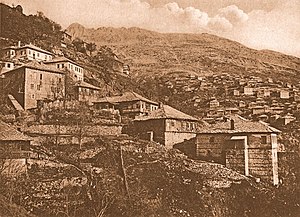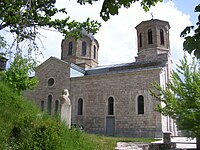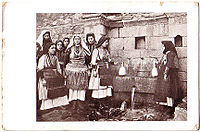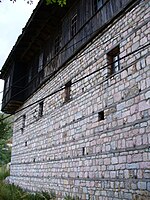Galičnik: Difference between revisions
No edit summary |
m Add wikilinks. |
||
| (33 intermediate revisions by 12 users not shown) | |||
| Line 1: | Line 1: | ||
{{Expand Macedonian|Галичник|date=January 2022}} |
{{Expand Macedonian|topic=geo|Галичник|date=January 2022}} |
||
{{Infobox settlement |
{{Infobox settlement |
||
<!--See Template:Infobox Settlement for additional fields that may be available--> |
<!--See Template:Infobox Settlement for additional fields that may be available--> |
||
| Line 83: | Line 83: | ||
|elevation_min_ft = |
|elevation_min_ft = |
||
<!-- Population -----------------------> |
<!-- Population -----------------------> |
||
|population_as_of = |
|population_as_of =2021 |
||
|population_footnotes = |
|population_footnotes = |
||
|population_note = |
|population_note = |
||
|population_total = |
|population_total =48 |
||
|population_density_km2 = <!--For automatic calculation, any density field may contain: auto --> |
|population_density_km2 = <!--For automatic calculation, any density field may contain: auto --> |
||
|population_density_sq_mi = |
|population_density_sq_mi = |
||
| Line 108: | Line 108: | ||
}} |
}} |
||
'''Galičnik''' ({{ |
'''Galičnik''' ({{langx|mk|Галичник}}) is a mountain village in [[North Macedonia]] and along with [[Lazaropole]] is one of the two biggest and oldest [[Mijaks|Mijak]] villages in the region. Galičnik has well-preserved traditional [[architecture]], including an [[Amphitheatre|amphitheater]] in the village square, and is famous for its surrounding countryside and nature reserve. |
||
==Location== |
|||
It is located on the [[slope]]s of the [[Bistra Mountain]], some 10 km from the artificial [[Mavrovo Lake]] and the ''Zare Lazarevski'' winter resort. |
|||
==History== |
==History== |
||
The village is located in the ethnographic region of "[[Mijačija]]", named after the [[Mijaks]] (Мијаци/Mijaci), the tribe historically inhabiting this mountainous region. This region has plentiful rich pastures for livestock grazing and this feature attracted [[Vlachs]], shepherds, who established settlements based on cattle-breeding and shepherding.<ref name="Welters1999">{{cite book|author=Linda Welters|title=Folk Dress in Europe and Anatolia: Beliefs about Protection and Fertility|url=https://books.google.com/books?id=35oIbNIIn-8C&pg=PA100|date=1 November 1999|publisher=Bloomsbury Academic|isbn=978-1-85973-287-8|pages=100–}}</ref> |
The village is located in the ethnographic region of "[[Mijačija]]", named after the [[Mijaks]] (Мијаци/Mijaci), the tribe historically inhabiting this mountainous region. This region has plentiful rich [[Pasture|pastures]] for livestock grazing and this feature attracted [[Vlachs]], shepherds, who established settlements based on cattle-breeding and shepherding.<ref name="Welters1999">{{cite book|author=Linda Welters|title=Folk Dress in Europe and Anatolia: Beliefs about Protection and Fertility|url=https://books.google.com/books?id=35oIbNIIn-8C&pg=PA100|date=1 November 1999|publisher=Bloomsbury Academic|isbn=978-1-85973-287-8|pages=100–}}</ref> |
||
There was a strong tradition of ''pečalba'', seasonal work, where many of the men would leave the village to work in larger towns and cities as skilled labourers such as masons, carpenters and painters. They would be absent from Galičnik for months or even years at a time. By seasonal work, they earned enough to support their families and sometimes made a fortune. |
|||
==Events== |
==Events== |
||
The most important event in the village is the [[Galichnik Wedding Festival|Galička Svadba]], a traditional wedding custom held annually in summer (in July), on the day of the village feast of the [[Patron Saint]] |
The most important event in the village is the [[Galichnik Wedding Festival|Galička Svadba]], a traditional wedding custom held annually in summer (in July), on the day of the village feast of the [[Patron saint|Patron Saint]] – ''[[Feast of Saints Peter and Paul|Petrovden]]'' ([[Saint Peter|St. Peter]]'s day). During the wedding, local men will dance the "[[Teškoto]]" (the ''"hard"'' or ''"heavy"'') - a dance that is meant to symbolize the overcoming of difficulties in life.<ref>{{cite web |
||
|url=http://www.soros.org.mk/konkurs/076/angver/Teskoto.html |
|url=http://www.soros.org.mk/konkurs/076/angver/Teskoto.html |
||
|title=Teskoto |
|title=Teskoto |
||
| Line 133: | Line 128: | ||
}}</ref> |
}}</ref> |
||
== Culture == |
|||
Another manifestation that takes place in Galičnik each year is the ''Galičnik Art Colony''. |
|||
The regional art, dress and music are rich in detail and original in character. While sharing characteristics of regional culture dating back centuries. |
|||
The traditional dress and costume adorned during ceremonial events is highly detailed and unique. Examples can be seen at museums.<ref>{{cite web |
|||
|url=http://britishmuseum.org/collection/term/x58364 |
|||
|title=Galičnik Items |
|||
|publisher=British Museum}}</ref> |
|||
The village is built based on traditional housing standards used for centuries in the region. Stone wall construction, supported by wooden beams, compact earth insulation and using stone slate roofing.<ref> |
|||
{{cite book |
|||
| ⚫ | |||
|first= |
|||
|author-link=www.slavkobrezoski.com |
|||
|date=1993 |
|||
|title=Rekanska Kuќa, Arhitektonsko Nasledstvo vo Makedonija |
|||
|url= |
|||
|location=University of Skopje, Architecture |
|||
|publisher=Bigoss |
|||
|page= |
|||
|isbn= |
|||
}}</ref> |
|||
=== Historic houses === |
|||
{{See also|Category: Galičnik}} |
|||
There are many houses owned by prominent families in Galičnik that are protected by the Macedonian Cultural Heritage Protection Office.<ref>{{Cite book |last=Bužaroski |first=Risto |title=Галичка повест |publisher=Skopje: NIK |year=2004 |pages=176 |language=mk |trans-title=Galičnik History |chapter=Naša Kniga}}</ref> A selected few are as follows: |
|||
* [[House of Jovan Muratovski]] |
|||
* [[House of Pejčin Tomovski]] |
|||
* [[House of Miloš and Dingo Melovski]] |
|||
* [[House of Pavle Cincarovski]] |
|||
* [[Residence of Gjorgji Čalčevski]] |
|||
[[File:Galicnik 1908.jpg|Galicnik 1908|300px]] |
|||
==Notable people from Galičnik== |
==Notable people from Galičnik== |
||
* [[Slavko Brezoski]] (1921-2017) |
|||
* Jakov Frchkovski |
|||
| ⚫ | |||
* Makarij Frckovski |
|||
| ⚫ | |||
* Kuzman Frchkovski |
|||
* [[Risto Ognjanovikj-Lonoski]] (1870-1941) |
|||
| ⚫ | |||
* [[Aleksandar Sarievski]] (1922–2002) |
* [[Aleksandar Sarievski]] (1922–2002) |
||
| ⚫ | |||
* [[Partenij Zografski]] (1818–1876) |
* [[Partenij Zografski]] (1818–1876) |
||
* [[Dimitrije Bužarovski]] (b. 1952) |
|||
| ⚫ | |||
| ⚫ | |||
| ⚫ | |||
<gallery widths="200px" heights="200px"> |
<gallery widths="200px" heights="200px"> |
||
| Line 153: | Line 178: | ||
Image:Galichnik-cheshma.jpg | Old postcard from Galičnik - 1903-1908. |
Image:Galichnik-cheshma.jpg | Old postcard from Galičnik - 1903-1908. |
||
Image:Galičnik_04.jpg | Architecture in Galičnik. |
Image:Galičnik_04.jpg | Architecture in Galičnik. |
||
Image:20090714_Galicnik_wedding_poster_2009.jpg | 2009: Galičnik's wedding poster. |
|||
File:Molba za dozvola za kupuvanje, Galicnik, 1917.JPG|Request with a stamp from Kipro Mitrev, from village Sushica, Galichnik area, asking to get permission to buy sheep. (18 March 1917) |
File:Molba za dozvola za kupuvanje, Galicnik, 1917.JPG|Request with a stamp from Kipro Mitrev, from village Sushica, Galichnik area, asking to get permission to buy sheep. (18 March 1917) |
||
File:Broj na ziteli po narodnost, Galicnik, 1917.JPG|Population by nationality in ten municipalities of the city's municipal government of the City Galichnik 1917. |
File:Broj na ziteli po narodnost, Galicnik, 1917.JPG|Population by nationality in ten municipalities of the city's municipal government of the City Galichnik 1917. |
||
</gallery> |
</gallery> |
||
==See also== |
|||
*[[Lazaropole]] |
|||
==References== |
==References== |
||
Latest revision as of 09:08, 8 December 2024
You can help expand this article with text translated from the corresponding article in Macedonian. (January 2022) Click [show] for important translation instructions.
|
Galičnik
Галичник | |
|---|---|
Village | |
 | |
| Coordinates: 41°35′39″N 20°39′11″E / 41.59417°N 20.65306°E | |
| Country | |
| Region | |
| Municipality | |
| Highest elevation | 1,500 m (4,900 ft) |
| Population (2021) | |
• Total | 48 |
| Time zone | UTC+1 (CET) |
| • Summer (DST) | UTC+2 (CEST) |
| Car plates | GV |
Galičnik (Macedonian: Галичник) is a mountain village in North Macedonia and along with Lazaropole is one of the two biggest and oldest Mijak villages in the region. Galičnik has well-preserved traditional architecture, including an amphitheater in the village square, and is famous for its surrounding countryside and nature reserve.
History
[edit]The village is located in the ethnographic region of "Mijačija", named after the Mijaks (Мијаци/Mijaci), the tribe historically inhabiting this mountainous region. This region has plentiful rich pastures for livestock grazing and this feature attracted Vlachs, shepherds, who established settlements based on cattle-breeding and shepherding.[1]
Events
[edit]The most important event in the village is the Galička Svadba, a traditional wedding custom held annually in summer (in July), on the day of the village feast of the Patron Saint – Petrovden (St. Peter's day). During the wedding, local men will dance the "Teškoto" (the "hard" or "heavy") - a dance that is meant to symbolize the overcoming of difficulties in life.[2]
Culture
[edit]The regional art, dress and music are rich in detail and original in character. While sharing characteristics of regional culture dating back centuries.
The traditional dress and costume adorned during ceremonial events is highly detailed and unique. Examples can be seen at museums.[3]
The village is built based on traditional housing standards used for centuries in the region. Stone wall construction, supported by wooden beams, compact earth insulation and using stone slate roofing.[4]
Historic houses
[edit]There are many houses owned by prominent families in Galičnik that are protected by the Macedonian Cultural Heritage Protection Office.[5] A selected few are as follows:
Notable people from Galičnik
[edit]- Slavko Brezoski (1921-2017)
- Lazar Ličenoski (1901-1964)
- Doksim Mihailović (1883–1912)
- Risto Ognjanovikj-Lonoski (1870-1941)
- Georgi Pulevski (1817–1895)
- Aleksandar Sarievski (1922–2002)
- Partenij Zografski (1818–1876)
-
Galičnik, Skudrinje and Debar lake.
-
Church of St. Peter and Paul.
-
Old postcard from Galičnik - 1903-1908.
-
Architecture in Galičnik.
-
Request with a stamp from Kipro Mitrev, from village Sushica, Galichnik area, asking to get permission to buy sheep. (18 March 1917)
-
Population by nationality in ten municipalities of the city's municipal government of the City Galichnik 1917.
References
[edit]- ^ Linda Welters (1 November 1999). Folk Dress in Europe and Anatolia: Beliefs about Protection and Fertility. Bloomsbury Academic. pp. 100–. ISBN 978-1-85973-287-8.
- ^ "Teskoto". www.soros.org.mk. Archived from the original on 2008-07-24. Retrieved 2008-10-19.
- ^ "Galičnik Items". British Museum.
- ^ Slavko Brezoski (1993). Rekanska Kuќa, Arhitektonsko Nasledstvo vo Makedonija. University of Skopje, Architecture: Bigoss.
- ^ Bužaroski, Risto (2004). "Naša Kniga". Галичка повест [Galičnik History] (in Macedonian). Skopje: NIK. p. 176.
External links
[edit]- Official web site of Galichnik
- Penultimate Phase of Procedure for Entrance of Galicnik Wedding in UNESCO List - Custom with More than 30 Rites
- Galicnik Macedonia, Kinoteka na Makedonija 1939-40 from filmarchivesonline
- Images from Galičnik
- Photos from Galichnik Wedding
- "Narodne pesme bugarske (iz Galečnika)", folk songs from Galichnik, published in the Croatian magazine "Kolo; Članci za Literaturu, Umetnost; Narodni Život", knjiga IV/V, Zagreb, in 1847.








